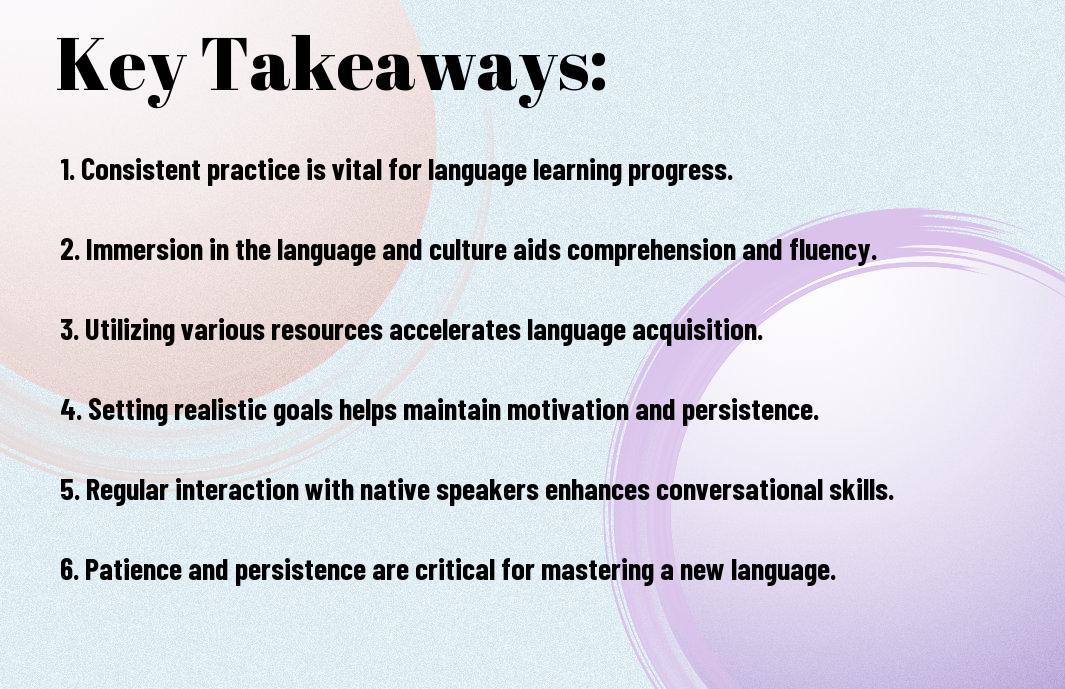Just commenceing on the journey of learning a new language? Mastering a new language can be a challenging yet rewarding experience. From consistent practice and exposure to native speakers to understanding the cultural context, there are key factors that can significantly impact your language learning success. In this blog post, we will explore the vital elements that can help you on your path to fluency. Let’s dive in and discover how you can effectively learn a new language and broaden your horizons.
Key Takeaways:
- Consistent practice: Regular and consistent practice is necessary for language learning.
- Immerse yourself in the language: Surround yourself with the language through media, books, and conversations.
- Patience and perseverance: Learning a new language takes time, so stay patient and motivated throughout the process.


Setting Realistic Goals
The key to successfully learning a new language lies in setting realistic goals. By establishing clear objectives and breaking them down into manageable chunks, you can make steady progress and stay motivated throughout your language learning journey.
Defining Achievable Objectives
One of the first steps in setting realistic language learning goals is defining achievable objectives. These objectives should be specific, measurable, and realistic. For example, instead of setting a vague goal like “I want to become fluent in Spanish,” try setting a more specific objective such as “I want to be able to hold a basic conversation in Spanish within three months.”
Breaking Down Long-term Goals into Manageable Chunks
The key to making progress in learning a new language is breaking down long-term goals into manageable chunks. This approach can help prevent you from feeling overwhelmed and enhance your sense of accomplishment as you achieve smaller milestones along the way. For instance, if your long-term goal is to reach an advanced level of proficiency in French, you can break it down into smaller objectives like mastering basic grammar concepts, building vocabulary related to specific topics, and practicing speaking and listening skills regularly.
Objectives that are broken down into smaller, more manageable tasks are easier to track and achieve, keeping you motivated and focused on your language learning goals. Bear in mind, Rome wasn’t built in a day, and fluency in a new language won’t happen overnight. By setting realistic goals and breaking them down into smaller steps, you can make consistent progress and eventually reach fluency in the language you are learning.

Creating an Optimal Learning Environment
You can significantly enhance your language learning journey by creating an optimal learning environment. Various factors influence language learning, and understanding them can help you tailor your study space and routine to maximize your progress. If you want to explore more on this topic, check out What factors influence language learning?.
Designing a Conducive Study Space
One of the first steps in creating an optimal learning environment is designing a conducive study space. Choose a quiet and well-lit area where you can focus without distractions. Keep all your language learning materials organized and within reach to maintain a sense of productivity and efficiency.
Minimizing Distractions and Interruptions
Space. To truly immerse yourself in the language learning process, it’s crucial to minimize distractions and interruptions. Find a time of day when you are least likely to be disturbed and inform those around you about your study schedule. Turn off notifications on your phone and computer to maintain your focus on learning the language.
Plus, consider using noise-canceling headphones or background music specifically designed to enhance concentration. By creating a serene and interruption-free study environment, you can boost your retention and comprehension of the new language.
Finding the Right Language Learning Resources
For successful language learning, the resources you choose play a crucial role. Textbooks, language learning apps, and online courses are traditional tools that can provide structured lessons, grammar explanations, and vocabulary practice. Textbooks offer comprehensive coverage of language rules and exercises to reinforce your understanding. Language learning apps and online courses offer interactive and engaging ways to learn with features like flashcards, quizzes, and audio exercises that cater to different learning styles.
Textbooks, Language Learning Apps, and Online Courses
For an effective language learning experience, it’s crucial to choose resources that align with your learning preferences and goals. Textbooks are beneficial for those who prefer a structured approach and enjoy working through lessons systematically. Language learning apps are suitable for those who prefer learning on-the-go and in short, interactive bursts. Online courses are ideal for learners seeking a more comprehensive and interactive learning experience with opportunities for feedback and practice.
Utilizing Authentic Materials and Native Speakers
One of the most effective ways to enhance your language skills is by incorporating authentic materials and interacting with native speakers. Immersing yourself in movies, music, books, and news in the target language can help you grasp colloquial expressions, cultural nuances, and improve your listening skills. Engaging with native speakers through conversation exchanges, language meetups, or online language exchange platforms can provide real-life practice and help you gain confidence in speaking the language.
Utilizing authentic materials allows you to experience the language in its natural context, enabling you to pick up on subtleties that may not be taught in traditional resources. Interacting with native speakers gives you the opportunity to practice your speaking and listening skills in real-time, helping you progress faster and develop a more authentic accent and intonation.
Developing Effective Language Learning Habits
After reading the insightful article on 7 Steps to Learn a New Language, you can take inspiration to establish effective language learning habits.
Establishing a Consistent Study Routine
To make significant progress in learning a new language, consistency is key. Setting aside dedicated time each day, even if it’s just 20-30 minutes, can greatly impact your language proficiency. Whether it’s early in the morning, during lunch breaks, or before bedtime, finding a routine that works for you will help maintain your focus and momentum. By incorporating language learning into your daily schedule, you create a habit that will eventually become second nature.
Practicing Active Recall and Spaced Repetition
Effective language learning involves engaging in active recall and spaced repetition techniques. This means actively recalling vocabulary, phrases, and grammar rules from memory rather than simply re-reading them. By testing yourself on what you’ve learned at regular intervals, spaced repetition helps reinforce memory retention. Incorporating these strategies into your study sessions can enhance your learning efficiency and long-term retention of language skills.
Consistent practice of active recall and spaced repetition not only aids in memorization but also strengthens your ability to recall information quickly and accurately. By actively engaging with the material and spacing out your review sessions strategically, you optimize your learning process and ensure that the knowledge stays fresh in your memory.
Overcoming Common Language Learning Obstacles
Once again, as you commence on the journey of learning a new language, you may encounter common obstacles that can hinder your progress. By understanding these challenges and learning how to navigate through them, you can increase your chances of successfully mastering a new language.
Dealing with Fear of Mistakes and Embarrassment
Common among language learners is the fear of making mistakes and feeling embarrassed when speaking the new language. Do not forget, making mistakes is a natural part of the learning process. Embrace them as opportunities to improve and grow. Instead of worrying about what others may think, focus on practicing and pushing yourself out of your comfort zone. The more you practice, the more confident you will become in expressing yourself in the new language.
Managing Frustration and Motivation
An crucial aspect of overcoming obstacles in language learning is managing your frustration and keeping yourself motivated throughout the journey. It’s common to feel frustrated when you encounter challenging aspects of the language or when progress seems slow. Break down your learning goals into smaller, achievable tasks. Celebrate your accomplishments along the way, whether it’s mastering a new vocabulary set or holding a conversation in the new language. Surround yourself with sources of motivation, such as setting realistic goals, tracking your progress, and seeking support from language learning communities or tutors.
Language learning is a process that requires patience, persistence, and a positive mindset. By acknowledging and addressing common obstacles like fear of mistakes, embarrassment, frustration, and lack of motivation, you can overcome these challenges and stay motivated on your language learning journey.
Leveraging Language Learning Strategies
Using Mnemonics and Association Techniques
To enhance your language learning, leverage mnemonic devices and association techniques. The human brain is adept at remembering vivid or unusual information, so creating associations or mental images can significantly aid in retaining new vocabulary. For example, when learning a new word in a foreign language, try associating it with a vivid image or a word in your native language that sounds similar. This technique can help cement the new word in your memory and make it easier to recall when needed.
Focusing on Grammar, Vocabulary, and Pronunciation
Language learning involves mastering the trifecta of grammar, vocabulary, and pronunciation. Grammar provides the structural framework for a language, dictating how words are arranged to form meaningful sentences. Vocabulary is the building blocks of communication, enabling you to express thoughts and ideas accurately. Pronunciation is crucial for effective communication, as it ensures that your message is clear and easily understood by native speakers.
With consistent practice and attention to these three key areas, you can make significant strides in your language learning journey. Note, language acquisition is a gradual process, so be patient with yourself as you work on honing your grammar, expanding your vocabulary, and perfecting your pronunciation.
To wrap up
On the whole, successfully learning a new language requires dedication, practice, and immersion. By setting clear goals, staying motivated, and practicing regularly, you can make significant progress in your language learning journey. Remember to be patient with yourself and celebrate small victories along the way. Immersing yourself in the language and culture through authentic resources will also greatly enhance your learning experience. Keep in mind that everyone’s language learning journey is unique, so find what works best for you and enjoy the process.
Q: What are the key factors in successfully learning a new language?
A: The key factors in successfully learning a new language include consistent practice, immersion in the language and culture, setting realistic goals, using various learning tools and resources, seeking feedback and corrections, and staying motivated and committed to the learning process.
Q: How important is consistent practice when learning a new language?
A: Consistent practice is crucial when learning a new language as it helps reinforce vocabulary, grammar, and pronunciation. Regular practice also improves fluency, confidence, and retention of the language skills. Setting aside dedicated time each day to study and practice the language can greatly accelerate the learning process.
Q: Why is immersion in the language and culture important for language learning?
A: Immersion in the language and culture is important for language learning as it provides real-life context and exposure to how the language is spoken and used by native speakers. By surrounding oneself with the language through activities such as watching movies, listening to music, reading books, and engaging in conversations with native speakers, learners can develop a deeper understanding and appreciation of the language, which can enhance their language skills.



